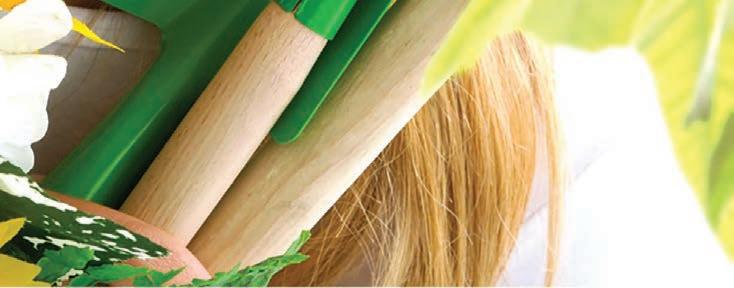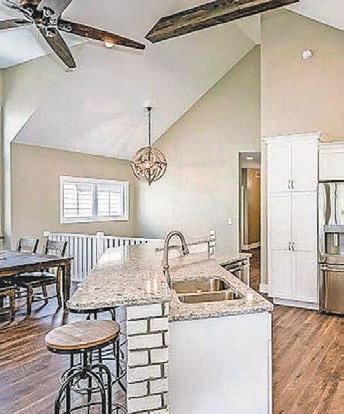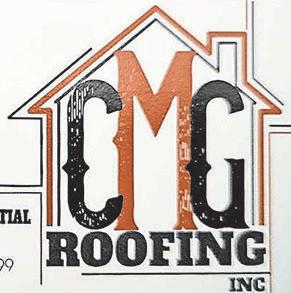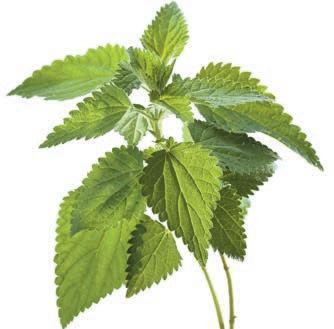






Spring 2024

What to know before you start building a retaining wall
Garage storage solutions
How to maintain a healthier home on a budget
Plus much more!









Spring 2024

What to know before you start building a retaining wall
Garage storage solutions
How to maintain a healthier home on a budget
Plus much more!

(BPT) - When you want to enhance your outdoor living space, consider building with retaining wall units. Segmental retaining wall (SRW) units are the basic building blocks of landscaping, and you will save on design and labor costs when you do it yourself. Whether you want to level a slope, build a sitting wall or add a raised patio, it’s essential to get informed before starting your project.
1.Check local rules. “Call 8-1-1 before you dig” is essential. Doit-yourselfers also should check with their municipalities and homeowner’s associations for building codes, permits and/or property variance rules. Some municipalities require permits for walls up to four feet tall, although engineering might not be needed for that height with most SRW systems. A retaining wall taller than four feet might require geogrid for soil reinforcement and an approved design by a professional engineer. A landscaping supply store will know local permit-
ting and can identify plans that might require an engineer.
where you will buy supplies. A landscaping supply store is a great place to get educated, purchase landscaping products and rent tools such as a compactor. A dedicated landscaping store can help you choose which wall system is best suited to your project, calculate the materials you will need and offer advice before, during and after installation.
“Do-it-yourself customers are the foundation of who we serve at Patio Town stores,” said David Johnson, who manages one of Patio Town’s three locations in St. Paul/Minneapolis. “We have a team that will listen to what customers are thinking of doing, and then offer solutions and options. Should customers decide a project is more than they want to do, we can refer them to our design-build division, Villa Landscapes.”
Story continued on next page







3.Learn about retaining wall systems. Some systems are easier to install, and some require specialty pieces for corners, curves and steps. The VERSA-LOK Standard retaining wall system is easy to install, and no special pieces are needed to build features. VERSA-LOK Standard is a solid unit that is renowned for ease of installation as there are no voids in the unit to fill. Splitting the unit allows you to create curves, corners, columns, multi-angled corners, freestanding walls and steps.
4.Mark off, measure and photograph the project area. In addition to giving details about your project to your landscaping supplier, you might need advice to determine soil conditions or stormwater requirements. For example, clay soil retains water so it may need amendment, or the wall might require drainage pipes based on soil and other factors. You can discuss the content of your soil with landscaping store staff, who can offer ideas on remediation if needed.
5. It is all about the base. The base is the most important course. Retaining wall manufacturers and landscape suppliers can offer product-specific details on how to excavate and prep the base. After excavating a trench for the base, the subsoil should be compacted before a few inches of gravel is


added and compacted. Make sure the area is level before starting the base course, which should be embedded half of the block’s height at a minimum. With solid units such as VERSA-LOK, there is no need for concrete footings as the base course serves as the foundation.
6.Finishing touches to consider. After each unit is placed and leveled, fill and compact the gravel placed behind the wall. Finish off your wall with capstone units that can be secured with adhesive; be sure your adhesive has elastic properties as modular walls are flexible so they can withstand freeze-thaw cycles.
Another important point to consider is the weather! Bad weather can hinder your installation. With a little planning, know-how and a trusted landscaping store that shares advice throughout your project, you can build successfully with retaining wall units.





Who doesn’t have a space at home that serves as a catch-all for items that seemingly have no other home? For many, this storage wasteland where items go to be forgotten tends to be the garage. Before long, clutter can overwhelm the space and create an eyesore. Garage clutter also makes the space less functional by making it harder to park a vehicle or store equipment.
Organizing a garage takes work, but the end result can improve the appearance, free up space, make work more efficient, and make it easier to find and use tools more readily. Here are some ways to get started on organizing your garage.
One of the first steps when organizing a garage is to thoroughly analyze what is needed and what can be removed from the garage. If items belong elsewhere, such as in a shed or the basement, move these items first. Discard damaged or broken items. Next, move on to tools or gear that hasn’t been used in some time. Will you use it again? If the item has been collecting dust for years, you likely already know the answer to that question.
Pile all items in the driveway so you
have a clean slate with which to start. Measure the room to figure out the dimensions so you’ll know how much wall space is available for storage.
The ultimate goal of a garage storage renovation is to make floor space available, according to Stacey Schweiger of Sunshine Organizing. Lifting items off the floor makes access easier, and protects items should there be a flood or leaks.
A combination of wall shelves, overhead shelves, cabinets, and wall hooks can help homeowners create more floor area. Organization becomes easier when everything has a designated space where it can be easily returned to.
When investing in shelving and racks, remember that many of the items stored in garages tend to be heavy. It’s important to ensure that shelves and hooks are heavy-duty and able to withstand the weight of pressure put on them. Verify the maximum weight so that racks will not buckle or tip over and cause issues.

Overhead storage can be reserved for items that aren’t used frequently, such as seasonal decorations or luggage.
Some items should be stored out of sight and beyond the reach of children and pets. Cabinets and containers can be used and locked to secure materials, such as fertilizers, paints, solvents,

and other chemicals.
Magnets, pegboards, organization bins and systems, and similar products can be used to corral small or errant items like hand tools, fasteners and more. Garage organization will take some planning and time, but the end result can be well worth the effort.
TF23C524








Al fresco entertaining has taken off in recent years. It’s much more common today to find homeowners who want to extend living spaces to the outdoors in meaningful ways that go beyond a few lawn chairs and a standalone grill. Dream backyard living rooms mirror similar spaces indoors and contain features like cozy corners, lush furniture and televisions or movie projectors. Plus, they often abut additional outdoor luxuries like fully functional kitchens.
Homeowners have various options when designing outdoor living spaces. Above all else, spaces should be created with the goal of encouraging people to get together. Here are some ideas.
Homeowners with pools and other water features likely want this area to be the star of the entertaining space. Furniture will be more of the lounging variety, with comfortable chaises and spots to catch the sun. If a swim-up bar isn’t possible, a rolling bar cart can be stocked with essentials for cocktails or mocktails for the kids. Furniture near the pool will be exposed to a lot of sun, so look for durable, sun-resistant fabrics.
Gathering around an outdoor fireplace or fire pit is a treat when the weather cools down. Mirror the look of the same setup indoors by arranging outdoor sofas so they flank the
fireplace. Add some ottomans or side tables for stowing mulled cider or hot chocolate. A mantel above the fireplace can hold pots of greenery or candles that add to the ambiance.
Unused corners on a patio or rooftop retreat can utilize a custom-made banquette that provides the functionality of a sofa sectional outdoors. Have a contractor design it to the exact specifications of the area, and add a rug to ground the space.
Depending on the entertaining space, a balance of soft grass, pavers or other hardscape will be necessary. Certain areas will need to be hard enough for chairs and other furniture, particularly for those who are including an outdoor dining table in the design.
Some homeowners are lucky enough to have natural barriers that offer privacy in their entertaining spaces. When there isn’t enough, tall shrubs, inexpensive bamboo fencing or trellis can provide a blind that makes an outdoor living area more cozy and private. Consider placing tall, potted plants on rolling casters to improve privacy as the need arises. Outdoor living spaces are all the rage, and they can add value and functionality to most any home.
SH242654














Air Duct Cleaning
Area Rug Cleaning
Carpet Cleaning
Cemetery Headstone Cleaning
Dryer Vent Cleaning
Estate Clean Out Services
8730

Gutter Cleaning
Home Storage & Organization
Pet Odor & Stain Removal
Tile & Grout Cleaning
Upholstery Cleaning
Water Restoration
ruby2clean@hotmail.com
No homeowner wants pests to invade their homes or their yards. However, it’s easy for pests to find their way into and around a home. In fact, certain condi tions may be inviting pests to a property.
• Garbage: Piles of garbage offer food and shelter to pests. Removing garbage piles and cleaning up food waste promptly can make a difference.
• Stagnant water: Mosquitoes breed in standing water, which is water not affected by waves, current or a filtration system. Anywhere water has pooled, mosquitoes may be breeding.
• Moisture or standing water: Additional sources of water and moisture may attract pests like gnats, mosquitoes, stink bugs, and certain spiders. Damp areas are of particular concern, especially when combined with darkness.




• Firewood: Firewood may attract a variety of pests, including termites and weevils. Firewood also may contain eggs that were laid before trees were cut down. If firewood is needed, it should be stacked far away from a home.

• Clogged gutters: Ignoring clogged gutters can lead to pest problems. Mice, squirrels, birds, ants, and spiders may be attracted to damp leaves in clogged gutters. Leaves offer shelter, nesting material and possible food sources of insect life.
• Dirty dishes and indoor trash: Leaving food-covered dishes in the sink invites pests. Leftover food attracts cockroaches, flies, ants, and more. Even if time is short, it’s best to wash dishes or load them into the dishwasher. Overflowing trash also draws pests into a home.

Clutter provides hiding places for all sorts of rodents and insects, which can hide out in cluttered areas and remain comfortable. Going room to room and clearing out extraneous items may help reduce pest populations. Focus on the garage and basement, in particular. Pests are attracted to certain conditions, and remedying these issues can help reduce pest infestations. TF244872






(BPT) - Living healthily remains a primary concern for many today, with homeowners looking to make home improvements with an emphasis on the health benefits of living in an environmentally friendly space.
The journey to a healthier home begins by identifying areas needing regular maintenance and determining which environmentally friendly products can replace current ones. Here’s a roundup of beneficial and feasible home enhancements:
The U.S. Environmental Protection Agency (EPA) states that indoor air can be up to five times more polluted than outdoor air. The air filters in your home’s heating and cooling equipment weed out contaminants like dust and pet dander; however, a dirty filter hampers their efficiency. Regularly cleaning or changing these filters, especially HEPA filters that cost as little as $30, can ensure clean air.
A costless preventive measure is to maintain the proper functioning of smoke and carbon monoxide detectors throughout your home. Fires and carbon monoxide poisoning are more likely during winter when homes are typically heated, making detector
maintenance an important step.
Water filters offer a health-centric and budget-conscious upgrade to homes. Filter pitchers start from as low as $20, and there are more upscale alternatives available like under-sink, countertop or faucet-mounted systems.
Water leak detection devices present another home improvement avenue. These systems alert homeowners when a leak is detected and can automatically shut off the water system if a significant issue exists. Mercury Insurance offers a related discount to eligible homes equipped with these devices.
Attentions have shifted due to concerns over the composition of traditional cleaning products, paints, flooring and construction materials. Many homeowners now prefer environmentally friendly alternatives. Look for biodegradable products based on renewable resources. When painting the walls of your home, look for volatile organic compounds (VOC)-free options or those that are Green Seal or GreenGuard certified.


When it comes to appliances, aim for LEED-certified or STAR-rated products for lower energy usage and eligibility for an insurance discount for green homeowners. For flooring, consider alternatives like unfinished hardwood, stone or concrete, and carpets made from natural fibers. Look for non-toxic adhesives to further limit chemical exposure.
For building materials like drywall and insulation, opt for GreenGuard-certified products to avoid
hazardous chemicals.
Adopting routine maintenance and home improvements can foster a healthier living environment and offer financial rewards. For instance, Mercury Insurance provides a 5% green home insurance discount to homeowners with a certification from either the U.S. Green Building Council LEED or the National Association of Home Builders Green Building Guidelines (NAHB).






Spending time in the backyard can be restorative and relaxing. Is it any wonder why homeowners are increasingly improving their homes so that they can blur the lines between the indoors and outside and enjoy more recreational moments in nature?
Part of what makes a landscape inviting is the bevy of plants dotting suburban landscapes. Individuals may take painstaking pleasure in mapping out landscapes that are both functional and appealing. When selecting foliage, it’s wise for homeowners to familiarize themselves with certain plants that may not be very welcome in their entertaining areas — particularly those that are dangerous. Poison ivy, oak and sumac may be some of the better-known poisonous plants, but there are others that can prove problematic as well.
• Hogweed: This is an invasive plant that grows throughout North America but is particularly well-known along the Atlantic coast.
The sap in the leaves can cause phytophotodermatitis, which is a chemical reaction after exposure to sunlight. Painful, severe blisters can form on the skin wherever it touches, and hogweed sap may cause blindness if it gets into the eyes.
• Lily of the Valley: This plant is known for delicate, bellshaped flowers and a sweet scent. While Lily of the Valley is not poisonous to touch, if ingested, toxic glycosides in the flowers, berries, leaves, and stems may cause a host of problems, including disorientation, vomiting, blurry vision, and rashes.

unique flowers that resemble tiny pink or white hearts with drops of blood at the bottom. Roots and foliage of Bleeding Heart contain alkaloids that are toxic to animals if ingested in high quantities.
• Nerrium Oleander: All parts of this beautiful shrub are extremely poisonous. It should definitely be kept away from pets and treated with caution or avoided altogether.

• Bleeding Heart: Native to woodlands, this perennial loves the shade. It produces

• Foxgloves: Adored among pollinators, Foxgloves produce towering pink and white trum pet blooms in early sum mer. The whole plant is toxic if eaten, however. People who eat any part or attempt to make tea may find their heart rate slowing down or becoming irregular.
• Stinging Nettle: Brushing up against Stinging Nettle can be a painful experience. The plant has tiny stinging hairs on its leaves and stems.
• Wild Hemlock: This is a very poi sonous member of the carrot family. If consumed, Wild Hemlock, which





looks like parsley, can cause health problems. Toxins also can be absorbed through the skin.
• Deadly Nightshade (Belladonna): A beautiful plant that produces shiny, black cherry-like berries, this contains a poison that can paralyze the gastrointestinal muscles and eventually the heart. The Royal Horticultural Society says that even rubbing up against it can irritate the skin.
Many plants, however beautiful, be dangerous if ingested or

While beautiful, Nerrium Oleander can invoke toxic reactions from merely touching the sap.
